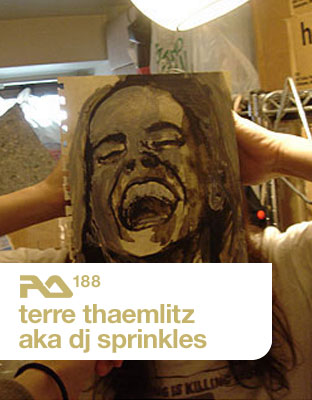|
press プレス |
|
RA.188 Terre Thaemlitz Podcast The producer behind RA's #1 album of 2009 starts off the year with an acoustic-electro ambient mix. - Richard Chinn |
In Resident Advisor (Australia), January 4 2010.

Terre Thaemlitz, AKA DJ Sprinkles, AKA G.R.R.L., AKA Kami-Sakunobe House Explosion K-S.H.E, AKA Social Material, AKA Teriko, AKA Terre's Neu Wuss Fusion, is something of a polymath. After moving to New York in the mid-'80s and getting bit by the house music bug, Thaemlitz adopted the aforementioned Sprinkles guise and quickly found a place via idiosyncratic DJing that combined the undeniable glamour of house music and "challenging, elaborated structures" as Thaemlitz bio puts it.
It was a combination that didn't exactly make for populist sets, to say the least. But in listening to mixes since, you can tell that Sprinkles knows how to party. Nonetheless, this alienation from the house scene found its way back into Thaemlitz's music at various points - most powerfully as part of Midtown 120 Blues - but the RA podcast prepared for us is largely geared towards the voluminous work done under Thaemlitz name. Encompassing tracks that Thaemlitz has dubbed "acoustic-electro ambient," like The Orb's first podcast of 2008, it invites you to start the year slowly, in a contemplative manner.
What have you been working on recently?
For the past four years or so I've been working on a new computer music project called "Soulnessless," which you might categorize as the follow-up to Lovebomb. It is a massive project investigating the limits of the album format in the MP3 era, with a 30 hour piano solo filling a single 4GB MP3 file (the largest currently allowed on Mac & Win according to FAT32 restrictions), an hour-long video DVD of other materials, pages and pages of text and photos in .PDF format... But the end is in sight, as I am working on the video and text now. Hopefully it will be done in the first half of 2010.
How and where did you record the mix?
I mixed it at Meow, my home studio in Kawasaki, using a standard digital audio sequencer.
Can you tell us a little bit about the idea behind the mix?
The mix combines a lot of genres, spanning a lot of years (from the '70s up to today), and putting in some of my own tracks to show the influences they had on me. I enjoy this kind of cross-genre and cross-era mixing, rather than hammering people with a single genre from a single era. I also wanted it to reflect an electronic sound, but not necessarily digital. It's quite old-school ambient DJ-ing.
Were you surprised by the reaction to Midtown 120 Blues in comparison to previous work around the same themes? Was the time simply right?
I assume we are not just talking about on RA, but reactions generally. To be frank, the difference this time was business, and I think it would be a mistake to romanticize it as anything else. The album was released through a commercial label with established distribution contacts and promotion. And visibility or chatter do not necessarily equate with sales. So I'm rather detached from it all - not as a jaded bitch, but as a person alienated by labor under capitalism.
For example, none of this has generated interest in my other projects or my own label's releases, so it really seems quite isolated as a phenomenon of the commercial music industry - connections between labels, distributors, retailers and press. It's only in critical relation to this context that any of the reactions take on a meaning that is possibly valuable to me. This is not to dismiss the good wishes of individuals. It's simply positioning those wishes and desires in relation to the commercial processes through which they find expression - which is also how I receive them.
You talk a bit about the house scene in NY during the late '80s on Midtown 120 Blues. Tell us a bit about what your Deeparama parties in Japan were like.
They were quite different from New York parties in that they were not revolving around sex, cruising or drugs. And, surprisingly or not surprisingly, the biggest difference resulting from these changes was that people were actually listening to the music. I feel conflicted about this sort of situation - about the loss of sexuality versus the gain of listening attentively. The K-S.H.E album Routes Not Roots was made when those parties were running, and really tried to deal with the contradictions of being a white, transgendered, queer DJ playing what is commercially naturalized as black music at an a-sexual event in Japan. But the overall feeling of the events were sincere people who danced for hours on end. Personally, I really enjoyed it. I'm still doing "Deepa-Licious" events in Kyoto once or twice a year, and they're trying to bring them to Tokyo as well - we had one at Club Module (where Deeperama was held) a few months ago, and will hopefully do that again in 2010.
What are you up to next?
In the first quarter of 2010 there will be some more DJ Sprinkles vinyl releases on Mule (Japan) and Skylax (France). The Berlin-based publisher b_books is also supposed to come out with a book compiling all of my writings (bilingual english/german). Meanwhile, I'm trying to wrap up that damned "Soulnessless" project!